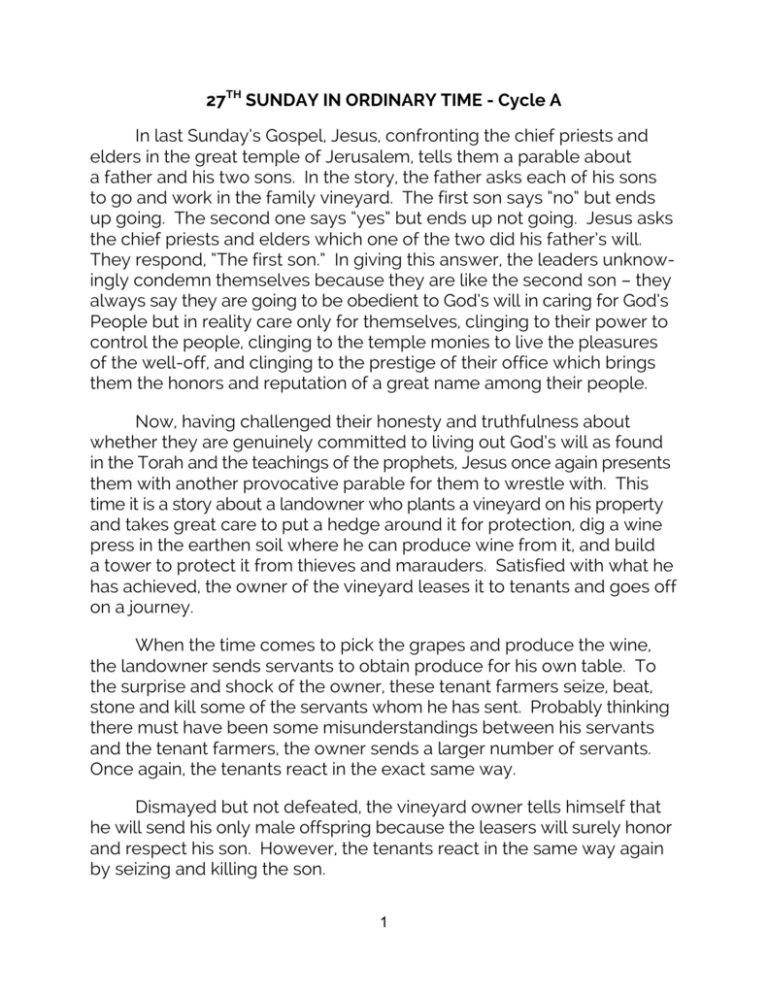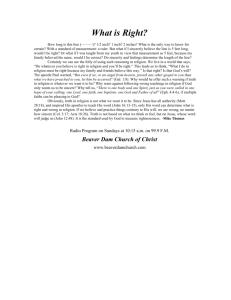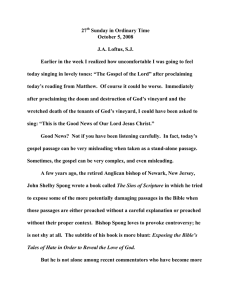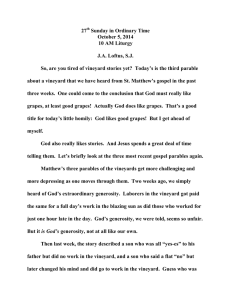27th_Sun_OT_ A_10-5
advertisement

27TH SUNDAY IN ORDINARY TIME - Cycle A In last Sunday’s Gospel, Jesus, confronting the chief priests and elders in the great temple of Jerusalem, tells them a parable about a father and his two sons. In the story, the father asks each of his sons to go and work in the family vineyard. The first son says “no” but ends up going. The second one says “yes” but ends up not going. Jesus asks the chief priests and elders which one of the two did his father’s will. They respond, “The first son.” In giving this answer, the leaders unknowingly condemn themselves because they are like the second son – they always say they are going to be obedient to God’s will in caring for God’s People but in reality care only for themselves, clinging to their power to control the people, clinging to the temple monies to live the pleasures of the well-off, and clinging to the prestige of their office which brings them the honors and reputation of a great name among their people. Now, having challenged their honesty and truthfulness about whether they are genuinely committed to living out God’s will as found in the Torah and the teachings of the prophets, Jesus once again presents them with another provocative parable for them to wrestle with. This time it is a story about a landowner who plants a vineyard on his property and takes great care to put a hedge around it for protection, dig a wine press in the earthen soil where he can produce wine from it, and build a tower to protect it from thieves and marauders. Satisfied with what he has achieved, the owner of the vineyard leases it to tenants and goes off on a journey. When the time comes to pick the grapes and produce the wine, the landowner sends servants to obtain produce for his own table. To the surprise and shock of the owner, these tenant farmers seize, beat, stone and kill some of the servants whom he has sent. Probably thinking there must have been some misunderstandings between his servants and the tenant farmers, the owner sends a larger number of servants. Once again, the tenants react in the exact same way. Dismayed but not defeated, the vineyard owner tells himself that he will send his only male offspring because the leasers will surely honor and respect his son. However, the tenants react in the same way again by seizing and killing the son. 1 Jesus pauses for a moment to allow the story to sink in, and then asks the temple leaders, “What will the owner do to those tenants when he comes?” Angered at what the tenants did to the son of the vineyard owner, they answer in unison: “The owner of the vineyard will put those wretched men to a wretched death and lease his vineyard to other tenants.” As occurred in last week’s Gospel, the chief priests and elders answer Christ’s question in a way that, without realizing it, they condemn themselves to their own death sentence. Immediately, Jesus quotes a powerful verse from Psalm 118 reminding them that they, the builders who govern the temple, have rejected the stone which has become the cornerstone of the great edifice. That stone, that cornerstone, which holds the temple together, is none other than Jesus himself. Therefore, Jesus concludes with a powerful judgment upon the chief priests and elders: “Therefore, I say to you, the kingdom of God will be taken away from you and given to a people that will produce its fruit.” In pondering this story and its meaning for us, do we not need to ask ourselves if we, too, are failing to be attentive to the values and teachings of the Gospel? Are we Catholics failing to listen to the contemporary prophets of our own time who have called us to a different way of life: Pope John XXIII, Mother Teresa of Calcutta, Pope John Paul II, Archbishop Romero of El Salvador, Dorothy Day, Jean Vanier, and very much our present Pope Francis, all of whom have summoned us to review our values, our attitudes, our lifestyles and our behaviors? Does our church, our diocese, our parish need to do an evangelical and moral inventory to see whether or not we truly are living the Gospel of mercy and forgiveness, the Gospel of justice and reconciliation, the Gospel of truth and humility, the Gospel of joy and peace? Is it possible that God would take away the gift of God’s kingdom from us because we as a people are failing to produce the fruits of the kingdom? Those fruits remain the ones proclaimed by Paul in today’s second reading. They become the norm and criteria by which we can assess and evaluate how we, collectively and individually, are living the Gospel of Jesus faithfully and consistently. It is worth naming them once again as we conclude today’s homily in a spirit of prayer and reflection about the 2 spiritual quality and depth of our Gospel vocation as ones who call ourselves Christians, disciples of Jesus Christ. Paul reminds us in his Letter to the Philippians: “Keep on doing what you have learned and received and heard and seen in me.” “Whatever is true, whatever is honorable, whatever is just, whatever is pure, whatever is lovely, whatever is gracious, if there is any excellence and if there is anything worthy of praise, think about these things.”. . . and do them. “Then the God of peace will be with you.” Yes, just as Paul encouraged us, in last week’s second reading, to do nothing out of selfishness or out of vainglory, rather humbly to regard others as more important than ourselves and thus to embrace the same mind and attitude that is also in Christ Jesus, so now he exhorts us to live whatever is true, honorable, just, pure, lovely, gracious, excellent, and worthy of praise. Then, my sisters and brothers in the faith, when we do so, we can say that we truly are walking in the footsteps of Jesus and producing the fruits and works of God’s kingdom here at St. Ignatius Church. Bill Watters, S.J. St. Ignatius Church Baltimore, MD 21202 October 5, 2014 3











